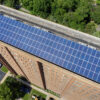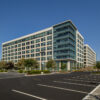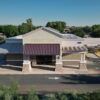In the aftermath of the pandemic, we have all made adjustments to our lives, one such adaptation in Suburban Commercial Real Estate Development has been the adoption of more flexible workspaces by its employees. The pandemic has accelerated the trend towards flexible and remote work, leading to an increased demand for flexible office spaces that can be adapted to different work styles and requirements. But has this hybrid work model impacted the development of commercial real estate in suburban parts of the country? In this article we will explore how the hybrid work model has impacted commercial real estate in suburban areas and what this means for developers, investors, lenders, and other key stakeholders.
The hybrid work model, which allows employees to work both remotely and in-person, is impacting suburban commercial real estate development in several ways. Firstly, the reduced demand for physical office space due to the increased adoption of remote work is leading to a decline in the demand for commercial real estate in urban areas and increasing the demand in suburban areas.
Suburban Commercial Real Estate Development is just one of many trends we are seeing.
Companies are now reconsidering their real estate needs, downsizing their offices, and exploring alternatives such as co-working spaces or flexible offices.
Secondly, the pandemic has also accelerated the trend towards online shopping, leading to a decline in demand for physical retail spaces. Retailers are now looking for ways to pivot towards e-commerce and reduce their physical footprint.
Thirdly, the increased availability of technology and remote communication tools has made it easier for companies to work with employees located in different locations, reducing the need for companies to have large, centralized offices in urban areas.
Lastly, the pandemic has also led to a shift in consumer preferences, with many people now preferring to live in suburban or rural areas where they have more space and can enjoy a better quality of life. This trend is leading to a decrease in demand for commercial real estate in urban areas.
Overall, these factors are leading to a decline in the demand for urban commercial real estate development, and real estate developers are now exploring alternative strategies such as repurposing buildings for residential or mixed-use developments to adapt to the changing market conditions.
Suburbanization, which refers to the outward growth of population and economic activities from urban areas into surrounding suburban areas, has had a significant impact on commercial real estate development, more so since the post pandemic era. With more employees working from home or adopting the hybrid workspace has shifted demand for commercial real estate. As populations have migrated to suburban areas, there has been an increase in demand for commercial properties such as retail centers, office spaces and industrial facilities in these suburban locations. This has resulted in the development of new suburban commercial real estate development projects to cater to this demand. Mesa, Arizona Industrial Market is a key example. Transportation and infrastructure have also impacted commercial real estate through changes in transportation and infrastructure. As populations have moved to suburban areas, there has been a need for improved transportation infrastructure.
Overall, suburbanization has had a significant impact on commercial real estate, influencing demand, development patterns, and market dynamics in both suburban and urban areas. Real estate investors, developers, and stakeholders need to closely monitor and adapt to these changes to effectively navigate the evolving commercial real estate landscape shaped by suburbanization.
The trend towards suburbanization is continuing, with growing demand for mixed-use developments that combine residential, commercial, and retail spaces in walkable neighborhoods. Development of commercial real estate in suburban areas is just one of the current trends in commercial real estate, but the industry is constantly evolving and adapting to new challenges and opportunities.
If you are interested in learning more about the commercial real estate market in Phoenix or other markets, feel free to reach out to us at ICRE Investment Team anytime. We’d be happy to help supply you with information on any relevant properties or markets, alongside any connections in lending, investing, or consulting that you might need!
















